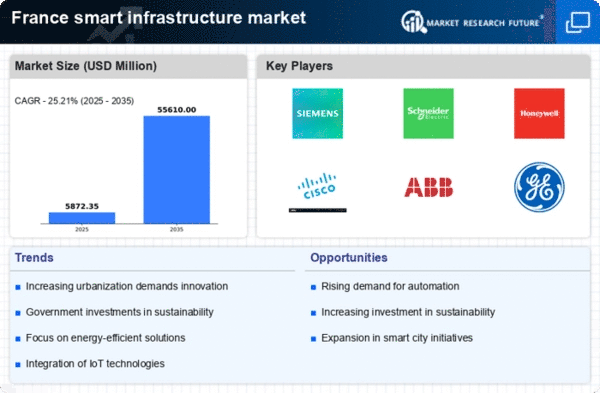Government Initiatives and Funding
The French government actively promotes the smart infrastructure market through various initiatives and funding programs. With a commitment to enhancing urban mobility and energy efficiency, the government has allocated approximately €1.5 billion to support smart city projects. This funding is aimed at integrating advanced technologies into public infrastructure, thereby improving service delivery and operational efficiency. The emphasis on digital transformation in public services is likely to drive the adoption of smart infrastructure solutions. Furthermore, the government's focus on reducing carbon emissions aligns with the objectives of the smart infrastructure market, as these technologies often contribute to sustainability goals. As a result, the smart infrastructure market in France is expected to experience significant growth, driven by these supportive government policies and financial incentives.
Rising Urbanization and Population Growth
France is witnessing a notable trend of urbanization, with an increasing population gravitating towards urban centers. This demographic shift is placing immense pressure on existing infrastructure, necessitating the development of smart solutions to manage resources efficiently. The urban population in France is projected to reach 85% by 2030, which indicates a growing demand for innovative infrastructure that can accommodate this influx. The smart infrastructure market is poised to benefit from this trend, as cities require advanced technologies to enhance transportation, energy management, and waste disposal systems. Moreover, the integration of smart technologies can lead to improved quality of life for residents, making urban areas more attractive. Consequently, the rising urbanization and population growth in France are likely to serve as significant drivers for the smart infrastructure market.
Technological Advancements in Infrastructure
The rapid pace of technological advancements is a crucial driver for the smart infrastructure market in France. Innovations in artificial intelligence, big data analytics, and the Internet of Things (IoT) are transforming traditional infrastructure into smart systems. For instance, the implementation of smart grids is enhancing energy distribution efficiency, while smart transportation systems are optimizing traffic flow and reducing congestion. The French government has recognized the importance of these technologies, investing heavily in research and development. In 2025, the smart infrastructure market is expected to grow by approximately 20%, driven by these technological advancements. As cities increasingly adopt these cutting-edge solutions, the smart infrastructure market is likely to expand, offering new opportunities for businesses and improving urban living conditions.
Increased Demand for Enhanced Public Services
The demand for improved public services is a driving force behind the smart infrastructure market in France. Citizens are increasingly expecting efficient, transparent, and responsive services from their local governments. This expectation is prompting municipalities to invest in smart technologies that enhance service delivery across various sectors, including transportation, healthcare, and public safety. For instance, smart traffic management systems can reduce congestion and improve travel times, while smart healthcare solutions can facilitate better patient care. The French government has recognized this need and is encouraging local authorities to adopt smart infrastructure solutions. As a result, the smart infrastructure market is likely to expand, driven by the increasing demand for enhanced public services that meet the expectations of a modern society.
Environmental Regulations and Sustainability Goals
France's commitment to environmental sustainability is a significant driver for the smart infrastructure market. The government has set ambitious targets to reduce greenhouse gas emissions by 40% by 2030, which necessitates the adoption of smart technologies in infrastructure development. These technologies not only enhance energy efficiency but also promote sustainable practices in urban planning. The smart infrastructure market is likely to thrive as cities implement solutions that align with these environmental regulations. For example, smart waste management systems can optimize resource use and minimize landfill waste. Additionally, the integration of renewable energy sources into smart grids supports France's sustainability goals. As a result, the push for environmental compliance and sustainability is expected to propel the growth of the smart infrastructure market.
















